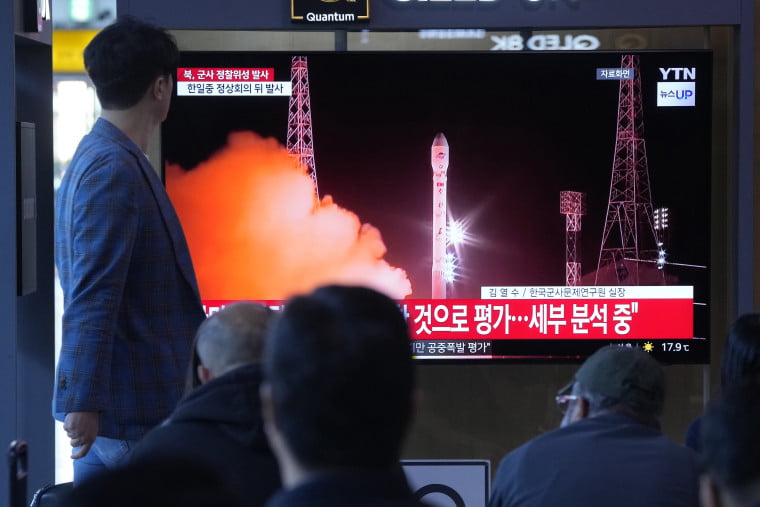Hours before the unsuccessful launch attempt on Monday, the leaders of South Korea, China, and Japan convened in Seoul for their first trilateral summit in almost four years.
In Short
- North korea’s spy satellite launch failed shortly after takeoff.
- The incident occurred during a trilateral summit between south korea, china, and japan in seoul.
- The failure undermines kim jong un’s plans to monitor south korea and the us.
- The launch drew criticism due to its potential link to long-range missile testing.
- Japan issued and later lifted a missile warning for okinawa.
TFD – In a dramatic turn of events, North Korea’s latest attempt to launch a spy satellite failed shortly after liftoff, coinciding with a high-stakes trilateral summit between South Korea, China, and Japan in Seoul. This failure marks a significant setback for Kim Jong Un’s ambitions to enhance surveillance capabilities over South Korea and the United States.

South Korea’s SEOUL A rocket used by North Korea on Monday to launch the nation’s second spy satellite burst shortly after takeoff, according to official media, undermining leader Kim Jong Un’s plans to deploy satellites to watch over South Korea and the United States.
Hours before the unsuccessful launch attempt on Monday, the leaders of South Korea, China, and Japan convened in Seoul for their first trilateral summit in almost four years. It is extremely atypical for North Korea to initiate aggressive measures in the midst of high-level diplomacy in the area being conducted by China, its main economic conduit and ally.
Because the UN forbids North Korea from carrying out any such launches and sees them as a front for testing long-range missile capability, the launch attracted criticism from the North’s neighbors.
According to the North’s official Korean Central News Agency, the country’s primary northwest space center successfully launched a spy satellite on a brand-new rocket. However, KCNA reported that a suspected engine malfunction caused the rocket to explode during a first-stage flight shortly after liftoff.
KCNA cited the unidentified vice director of the National Aerospace Technology Administration as saying that a preliminary examination showed that the explosion was related to the reliability of operation of the newly developed liquid oxygen-petroleum engine. He stated that further potential reasons will be looked at, per KCNA.
For a limited while, the Okinawan government in southern Japan issued a missile warning, advising locals to seek refuge within buildings and other secure locations. Chief Cabinet Secretary Yoshimasa Hayashi indicated that the area was no longer in danger, so the warning was later canceled.
The coast guard of Japan was informed by North Korea of its intended launch earlier on Monday. The notification included a warning to use caution in the waters east of the major Philippine island of Luzon and between the Korean Peninsula and China during the launch window, which ran from Monday through June 3.
North Korea has persistently asserted its entitlement to launch satellites and conduct missile tests.
The launch was referred to as “a serious challenge to the entire world” by Japanese Defense Minister Minoru Kihara. The North Korean satellite launch was described as “a provocation that seriously threatens our and regional security” by South Korea’s Unification Ministry.
In the earlier Monday trilateral meeting with Chinese Premier Li Qiang and Japanese Prime Minister Fumio Kishida, South Korean President Yoon Suk Yeol demanded harsh international action should North Korea proceed with its launch plan.
Li only made generic remarks about advancing peace and stability on the Korean Peninsula through political resolution; Kishida, on the other hand, pushed the North to rescind its launch plan.
According to some analysts, North Korea may have wanted to dampen the excitement for the Seoul, Beijing, and Tokyo summit and express its disapproval of China with its satellite launch on the first day of the eight-day window. China’s diplomacy with Seoul and Tokyo may have been unsettling for Pyongyang because Kim has been endorsing the notion of a “new Cold War” and attempting to form a united front against Washington by strengthening ties with Beijing and Moscow.
In recent months, Kim has mostly focused on Russia as Moscow and Pyongyang, who are both embroiled in conflicts with Washington, increase their military collaboration. China, which is far more conscious of its reputation abroad, has sided with Russia in opposing US-led efforts to impose stricter sanctions on the North at the UN Security Council, but it has been less outspoken and brazen in endorsing Kim’s “new Cold War” campaign.
A joint statement from Li, Yoon, and Kishida was sharply attacked by North Korea’s Foreign Ministry on Monday, branding it as “wanton interference in its internal affairs.” Sections of the joint statement that stated that the three leaders reaffirmed their current positions on the issue of denuclearization of the Korean Peninsula were criticized by the ministry.
It is still quite uncommon for North Korea to criticize a statement signed by China, even though the majority of its criticism was directed on South Korea for purportedly being primarily responsible for the statement.
In addition to his nation’s first military surveillance satellite, which was launched in orbit last November, Kim had planned to launch three additional military spy satellites in 2024. However, this plan has been derailed by the unsuccessful satellite launch.
Two unsuccessful liftoffs preceded the November launch.
Conclusion
North Korea’s failed spy satellite launch, happening amidst a critical trilateral summit in Seoul, underscores the ongoing tensions and high stakes in the region. This event not only highlights the challenges faced by Kim Jong Un’s regime in advancing its military technology but also the complex geopolitical landscape. As North Korea continues its provocations, regional security remains a pressing concern.
Connect with us for the Latest, Current, and Breaking News news updates and videos from thefoxdaily.com. The most recent news in the United States, around the world , in business, opinion, technology, politics, and sports, follow Thefoxdaily on X, Facebook, and Instagram .
